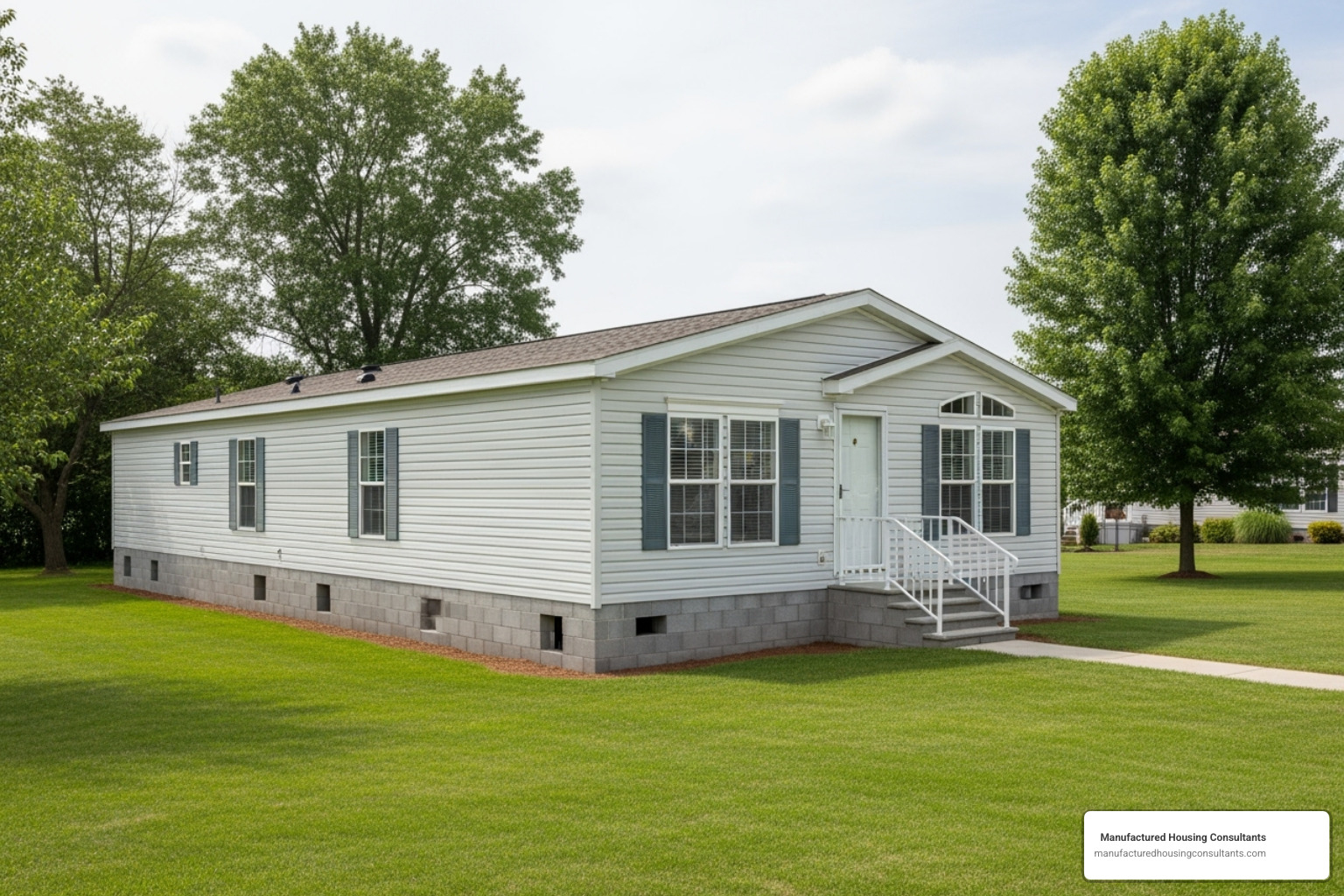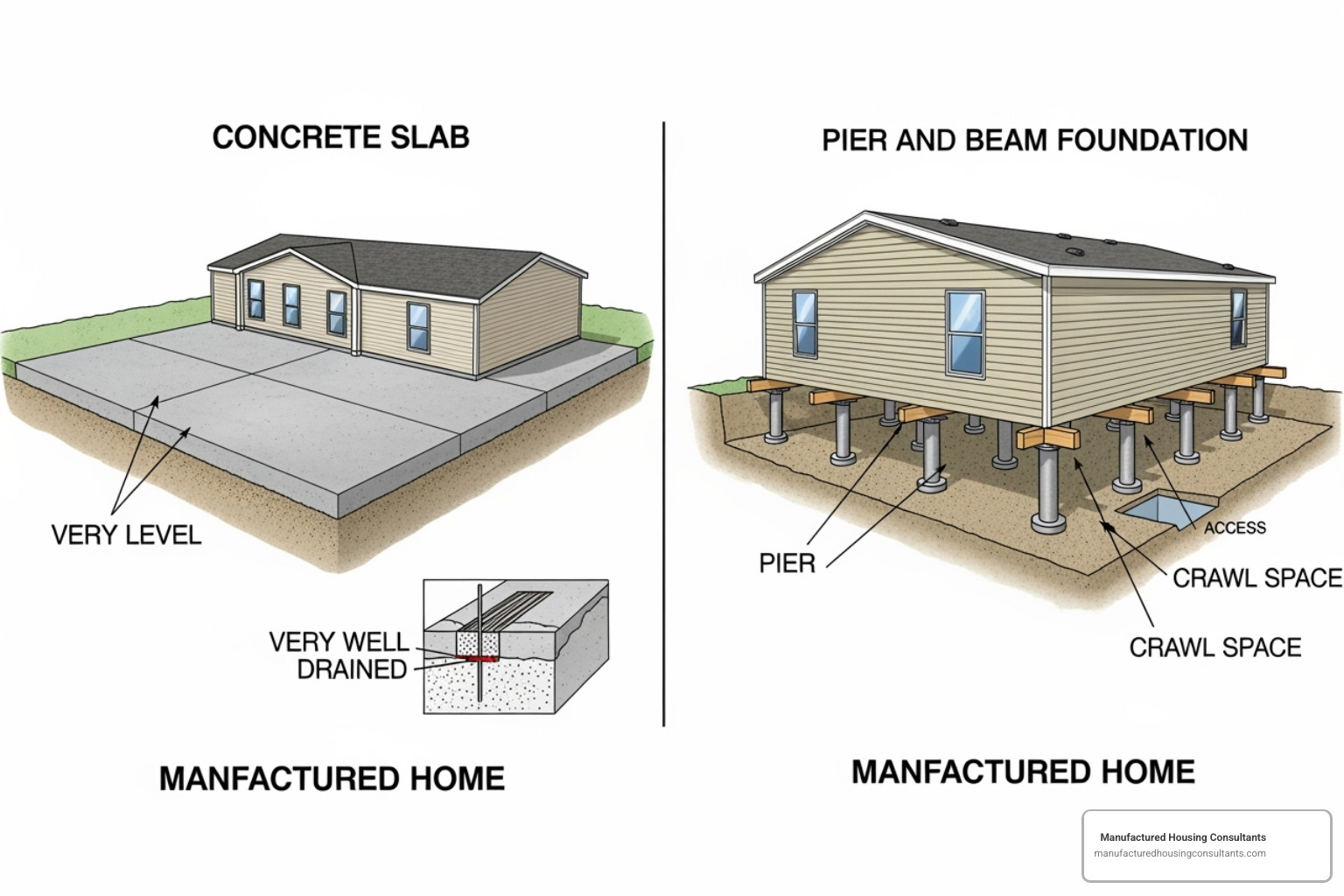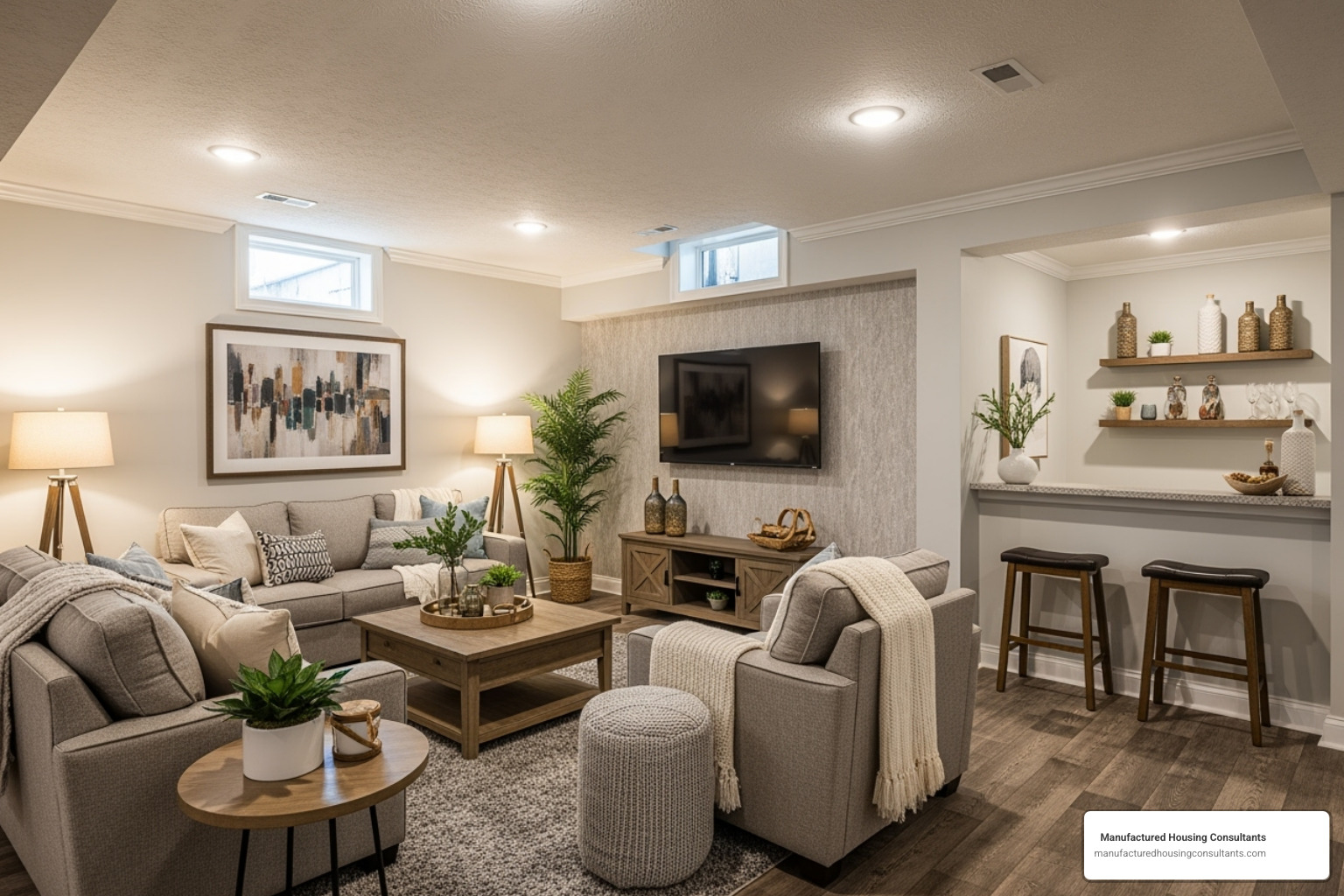What type of foundation is best for a manufactured home 4
Why Your Foundation Choice is the Bedrock of Your Texas Home
What type of foundation is best for a manufactured home? For most Texas homeowners, a pier and beam foundation offers the best balance of affordability, permanence, and adaptability to our state’s challenging soil conditions. However, the ideal choice depends on your specific lot, budget, and long-term goals.
Here’s a quick comparison of your main options:
| Foundation Type | Best For | Cost Range | Permanence |
|---|---|---|---|
| Pier & Beam | Most Texas soil types, flexibility | $$ | Permanent |
| Slab | Stable soil, faster installation | $$ | Permanent |
| Crawl Space | Extra storage/access needs | $$$ | Permanent |
| Basement | Maximum space, rare in Texas | $$$$ | Permanent |
Your foundation isn’t just what holds your home up; it’s the bedrock of your long-term investment. It determines your financing options, resale value, and whether you’ll face costly repairs down the road. In Texas, this choice is even more critical. Our expansive clay soil shifts with moisture, and our weather swings from drought to flooding. For manufactured housing in areas like San Antonio or Houston, the right foundation means the difference between a home that appreciates and one that becomes a maintenance headache.
A well-chosen foundation also impacts your financing. Lenders offering FHA or VA loans require manufactured homes to be on a permanent foundation meeting specific HUD guidelines. This allows you to secure a real estate mortgage rather than a higher-interest personal property loan. When it’s time to sell, a permanent foundation classifies your home as “real property,” boosting its market value and attracting more buyers.
The question of what type of foundation is best for a manufactured home is crucial in Texas. From the expansive clay soils around San Antonio and Von Ormy to the potential for severe weather, your foundation must be tough. To help you visualize the options, here’s a look at the four primary types:

This infographic provides a visual overview, but let’s dive deeper into each type to understand their nuances and how they perform under the Texas sky.
What Type of Foundation is Best for a Manufactured Home in Texas?
There’s no single answer that works for every home, especially in Texas where our soil and weather are challenging. At Manufactured Housing Consultants, we’ve helped countless families in our primary service areas of San Antonio and Von Ormy steer these choices. Let’s walk through your options to find what makes sense for your situation.
A Breakdown of Common Foundation Types: Pros, Cons & Costs
Here’s your field guide to the major foundation types, exploring where each one shines and where it struggles.

Pier & Beam Foundation
This is the workhorse for Texas manufactured homes. It uses concrete piers to support the home, creating a crawl space underneath. We recommend it often because it handles our temperamental, expansive clay soil beautifully, allowing for flex as the ground swells and shrinks. This crawl space also provides easy access for plumbing and electrical repairs, making them faster and cheaper. The downsides include potential for pests if not sealed properly and the need for good under-floor insulation.
Slab Foundation
A slab is a single, large piece of concrete poured on the ground. It provides a solid base that’s resistant to pests. However, it is a slab’s worst enemy. As the ground moves, a slab can crack, leading to structural damage. Any plumbing or electrical repairs require jackhammering through the concrete, which is expensive and disruptive. In areas around San Antonio with expansive clay, we advise extreme caution. Always get a professional soil test first.
Crawl Space Foundation
Think of this as an upgraded pier and beam, with continuous perimeter walls creating a more enclosed and protected space. You get the easy utility access of a pier and beam but with better defense against pests and moisture. It’s an excellent solution for sloping lots and signals quality to future buyers. The trade-off is cost, as it requires more materials and labor than a pier and beam or slab. You can learn more about various mobile homes everything you need to know on our site.
Basement Foundation
A full basement can double your living space and provides an excellent storm shelter. However, basements are rare and very expensive for manufactured homes in Texas. The cost of excavation, waterproofing, and engineering is substantial. Our clay soil and high water tables in many areas, including around San Antonio, make them impractical and risky. Given these challenges and our focus on affordable housing, Manufactured Housing Consultants does not offer basement foundations as an option for the homes we sell.
| Foundation Type | Cost | Permanence | Best Use Case | Pros | Cons |
|---|---|---|---|---|---|
| Pier & Beam | $$ | Permanent | Expansive clay soils, budget-conscious | Accessible utilities, good ventilation, flexible | Pest potential, requires insulation, moisture management |
| Slab | $$ | Permanent | Stable, non-expansive soil, quick install | Strong, pest-resistant, potentially lower initial cost | Poor for expansive clay, difficult repairs, no access |
| Crawl Space | $$$ | Permanent | Sloping lots, desired utility access, storage | Excellent access, better protection, adaptable | Higher cost, still needs moisture control |
| Basement | $$$$ | Permanent | Max space, storm shelter, ideal soil conditions | Max space, energy efficient, ultimate protection | Very high cost, complex drainage, rare in TX |
Key Factors for Choosing Your Foundation in the Lone Star State
Understanding your specific piece of Texas is key. What works in one location might be a disaster in another.
- Soil: Much of central and south Texas has expansive clay soil that swells and shrinks, putting immense pressure on foundations. This is why flexible systems like pier and beam are often recommended. Never assume your soil is stable; always get a professional soil test. While we do not perform these geological surveys ourselves, we can guide you on how to arrange for a professional soil test on your lot.
- Water and Weather: If your property is in a flood zone, codes will likely require an liftd foundation (pier and beam or crawl space). Proper drainage is essential everywhere. Your foundation and tie-down system must also be engineered to resist Texas wind and have footings below the local frost line.
- Land and Home: Sloping lots are best handled by pier and beam or crawl space foundations. The size of your home also dictates the support needed. If you’re comparing a modular vs manufactured home, note that their foundation requirements can differ. For technical details, HUD’s GUIDE TO FOUNDATION AND SUPPORT SYSTEMS FOR MANUFACTURED HOMES is an excellent resource.
What type of foundation is best for a manufactured home to be considered ‘permanent’?
This is a critical question. A permanent foundation meets local codes and HUD’s Permanent Foundations Guide for Manufactured Housing. This classification allows your home to be treated as real property (like a house) instead of personal property (like a car).
Why does this matter? To get an FHA or VA loan, your home must be on a HUD-approved permanent foundation, certified by an engineer. This open ups better interest rates and loan terms, saving you thousands. It’s important to clarify that Manufactured Housing Consultants is not a direct lender; our role is to ensure your home and foundation are built to the specific standards required by FHA, VA, and other lenders, streamlining your path to securing a real estate mortgage. It also significantly increases your home’s resale value. Any foundation type—pier and beam, slab, or crawl space—can qualify as permanent as long as it’s properly engineered and installed. For more details, check out our page on Foundation for Mobile Home.
What type of foundation is best for a manufactured home for added space and accessibility?
If you want your foundation to provide storage or easy maintenance, two types stand out.

The Basement Dream
A basement offers incredible space but is generally too costly and impractical for manufactured homes in Texas due to our soil and water tables.
The Crawl Space Sweet Spot
For most Texas homeowners, a well-designed crawl space is the goldilocks option. It provides valuable storage for seasonal items and tools. More importantly, it offers unparalleled access to utilities. A plumbing leak that would require breaking concrete on a slab foundation is a straightforward fix with a crawl space, saving you immense cost and disruption. This long-term practicality makes a crawl space a smart investment. If you’re interested in learning more about modular home foundations, check out our Modular Home Foundation Complete Guide.
Secure Your Investment: Making the Final Decision
Choosing a foundation is the bedrock of your investment, comfort, and peace of mind. We’ve covered why pier and beam foundations work well with Texas clay, how a crawl space adds accessibility, and why basements are a service we don’t offer. Getting this right affects your financing, stability, and your home’s ultimate value.
What Really Matters When You’re Ready to Decide
There’s no universal answer to what type of foundation is best for a manufactured home. The right choice depends on your specific situation.
- Your Texas Soil: In San Antonio and much of central Texas, you’re likely dealing with expansive clay. This makes a flexible pier and beam or crawl space foundation the safest long-term choice.
- Financing & Value: If you want an FHA or VA loan, you need a HUD-certified permanent foundation. This classifies your home as real property, allowing it to appreciate in value.
- Long-Term Costs: The accessibility of a crawl space can save you thousands in future repair costs for plumbing or electrical issues.
Why Professional Installation Isn’t Where You Cut Corners
A perfect foundation choice means nothing if it’s installed incorrectly. It’s important to understand that while we manage your entire home project, Manufactured Housing Consultants does not perform foundation installations or soil testing directly. Instead, we focus on what we do best—providing high-quality, affordable homes—and partner exclusively with experienced, licensed contractors who specialize in manufactured home foundations in the San Antonio area. They know our local soil and HUD requirements, ensuring the job is done right the first time while we oversee the process for you.
Let’s Build Your Future Together
Making the final decision means weighing your lot conditions, budget, and financing needs. These are the conversations we have with families every day at our San Antonio location. We’re here to ensure every piece of your housing puzzle fits together perfectly.
We guarantee the lowest prices on manufactured and mobile homes delivered anywhere in Texas, and we specialize in finding affordable housing solutions that don’t compromise on quality. Your new home deserves to rest on solid ground. We’ve helped countless Texas families, and we’d be honored to help you too.
Ready to take the next step? Find your ideal foundation today and let’s start building something solid together. Your future home is waiting, and we’re here to make sure it stands strong for generations.




